Finland men's national ice hockey team
The Finnish men's national ice hockey team, or Leijonat / Lejonen (The Lions in Finnish and Swedish), as it is called in Finland, is governed by the Finnish Ice Hockey Association. Finland is considered a member of the so-called "Big Six", the unofficial group of the six strongest men's ice hockey nations, along with Canada, United States, the Czech Republic, Russia and Sweden.
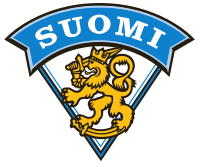 | |
| Nickname(s) | Leijonat / Lejonen (The Lions) |
|---|---|
| Association | Finnish Ice Hockey Association |
| Head coach | Jukka Jalonen |
| Assistants | Kari Lehtonen Mikko Manner Antti Pennanen |
| Captain | Marko Anttila |
| Most games | Raimo Helminen (331) |
| Most points | Raimo Helminen (207) |
| Team colors | |
| IIHF code | FIN |
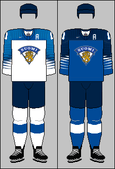 | |
| Ranking | |
| Current IIHF | 3 |
| Highest IIHF | 2 (first in 2011) |
| Lowest IIHF | 7 (2005) |
| First international | |
| Finland (Helsinki, Finland; 29 January 1928) | |
| Biggest win | |
| Finland (Hämeenlinna, Finland; 12 March 1947) | |
| Biggest defeat | |
| Canada (Oslo, Norway; 3 March 1958) | |
| IIHF World Championships | |
| Appearances | 65 (first in 1939) |
| Best result | |
| World Cup / Canada Cup | |
| Appearances | 7 (first in 1976) |
| Best result | 2nd: (2004) |
| Olympics | |
| Appearances | 14 (first in 1952) |
| Medals | |
| Medal record | ||
|---|---|---|
| Olympic Games | ||
| 1988 Calgary | Team | |
| 2006 Turin | Team | |
| 1994 Lillehammer | Team | |
| 1998 Nagano | Team | |
| 2010 Vancouver | Team | |
| 2014 Sochi | Team | |
| World Cup / Canada Cup | ||
| 2004 Toronto | ||
| 1991 Hamilton | ||
| World Championship | ||
| 1995 Sweden | ||
| 2011 Slovakia | ||
| 2019 Slovakia | ||
| 1992 Czechoslovakia | ||
| 1994 Italy | ||
| 1998 Switzerland | ||
| 1999 Norway | ||
| 2001 Germany | ||
| 2007 Russia | ||
| 2014 Belarus | ||
| 2016 Russia | ||
| 2000 Russia | ||
| 2006 Latvia | ||
| 2008 Canada | ||
| European Championship | ||
| 1962 United States | ||
| 1985 Czechoslovakia | ||
| 1986 Soviet Union | ||
| 1987 Austria | ||
| 1991 Finland | ||
| Winter Universiade | ||
| 1981 Jaca | ||
| 1997 Muju-Jeonju | ||
| 1970 Rovaniemi | ||
| 1985 Belluno | ||
| 1989 Sofia | ||
| 1991 Sapporo | ||
| 2005 Innsbruck | ||
Finland won the world championship title in 2019, which became their third after 1995 and 2011. A pair of silver medals (1988, 2006) remain the country's best Olympic result. At the Canada/World Cup, their best achievement is also a silver medal that they won in 2004.
Recent history
In the 1995 Men's World Ice Hockey Championships, Finland achieved its first ever gold in international ice hockey. Finland reached the final with a 5–0 victory over France in the quarterfinals, and a 3–0 victory over the Czech Republic in the semi-finals. In the finals, the Finns faced off against their hockey rivals and host of the 1995 tournament, Sweden. In the first period of the final, left wing Ville Peltonen scored a natural hat trick, and then assisted on Timo Jutila's first period goal to give Finland a 4–0 lead, on the way to an eventual 4–1 victory.
At the 1998 Olympic men's ice hockey tournament, Team Finland came away with Bronze, after defeating Canadian national team 3–2. Teemu Selänne led the tournament in goals scored (4) and total points achieved (10). The tournament was the first in which professional players from the National Hockey League (NHL) were allowed to participate, allowing national teams to be constructed using the best possible talent from each country. The 1998 Olympic tournament therefore came to be known as the "Tournament of the Century". Unlike previous Olympics where athletes could choose five-star hotel accommodations (such as the USA Men's Basketball team), NHL players were required to stay in the Olympic Village like other athletes.
At the 2006 IIHF World Championship, Finland achieved 3rd place winning the Bronze medal game against Canada. Petteri Nummelin was named to the Media All-Star team.
In the 2006 Winter Olympics, Finland won a Silver medal, coming close to winning in the final but losing 3–2 to Sweden. Finland's goaltender Antero Niittymäki was named the MVP of the tournament (only 8 goals against in the whole tournament) and Teemu Selänne was voted best forward. The format was changed from the 1998 and 2002 tournaments, to a format similar to the 1992 and 1994 tournaments. The number of teams was reduced from 14 to 12. The 12 teams were split into two groups in the preliminary stage, which followed a round robin format. Each team played the other teams in their group once. The top four teams from each group advanced to the quarter-finals.
At the 2007 IIHF World Championship, Finland lost the finals to Canada's national team. The final marked the second time that Finland and Canada met in the final of a World Championship, the first time being in 1994. However, only a year before in 2006 Finland had defeated Canada 5–0 in the Bronze medal game. In 2007, Canada were looking on form, being undefeated coming into the playoff round, while Finland had registered two losses in the run-up to the finals. Rick Nash scored on the powerplay at 6:10 into the first period on a one-timer from the point from a pass by Cory Murphy off of Matthew Lombardi, to put Canada up 1–0. Near the middle of the period, Eric Staal scored in similar fashion also on the powerplay, assisted by Justin Williams, and Mike Cammalleri. 9:11 into the second period, Colby Armstrong scored to give the Canadians a 3–0 lead. This goal ended up as the game winner. Finland had some discipline difficulty in the first two periods, taking 6 minutes apiece in penalties in both periods. Finland started to bring up the pressure in the last ten minutes, and Petri Kontiola scored a nice glove-side goal on Ward at 51:08 assisted by Ville Peltonen, to put the Finns on the board. Only with 3 minutes left Antti Miettinen scored to bring Finland within one, 3–2. However, only one minute later Rick Nash scored on a skillful breakaway to put the game away, 4–2 final for team Canada. The Canadians were outshot 22–18, but the Canadian goaltender, Cam Ward, kept them in the game as he was solid between the pipes. They also were able to capitalize on the powerplay, which ended up being decisive in the Canadian win. Kari Lehtonen was voted Tournament's best goaltender. At the 2008 IIHF World Championship, Finland achieved 3rd place winning the Bronze medal 4–0 against Sweden's national team.
At the 2010 Winter Olympics, Finland came away with 3rd place winning 5–3 against team Slovakia. During the tournament, Teemu Selänne of Finland became the all-time leader for points scored in the Olympics.[2][3] He notched an assist in his second game of the tournament for 37 career points, surpassing Valeri Kharlamov of the Soviet Union, Vlastimil Bubník of Czechoslovakia, and Harry Watson of Canada.[2][3]
At the 2011 IIHF World Championship, Finland won its second World Championship, beating the Swedish national team by a score of 6–1. As two highly ranked neighboring countries, Sweden and Finland have a long-running competitive tradition in ice hockey. Before the game, mainstream media in both countries titled the match "a dream final".[4][5] After a goalless first period, Sweden opened the game with a 1–0 goal by Magnus Pääjärvi in the second period at 27:40. Seven seconds before the period's end, Finland's Jarkko Immonen scored to tie the game 1–1. Finland took the lead early in the third period, scoring two goals at 42:35 and 43:21 by Nokelainen and Kapanen. Sweden took a time-out before the last period's half but did not manage to regroup, and the tournament was decided by a clear 6–1 victory to Finland by Janne Pesonen's, Mika Pyörälä's and Pihlström goals.[6] Team Finland's Jarkko Immonen led the Tournament in both goals and points scored with 9 and 12 respectively.
In recent years, Finland has been consistently ranked among the best teams in international hockey. Currently the team is ranked 3rd (26 May 2019) in the IIHF World Ranking. Finland won their third World Championship title at the 2019 IIHF World Championship in Slovakia.
Tournament record
Olympic Games
| Totals | ||||
|---|---|---|---|---|
| Games | Gold | Silver | Bronze | Total |
| 16 | 0 | 2 | 4 | 6 |
World Championship
Canada Cup / World Cup
| Year | Coach | Captain | Finish | Rank |
|---|---|---|---|---|
| 1976 | Lasse Heikkilä | Veli-Pekka Ketola | Round-robin | 6th |
| 1981 | Kalevi Numminen | Jari Kurri | Round-robin | 6th |
| 1987 | Rauno Korpi | Jari Kurri | Round-robin | 6th |
| 1991 | Pentti Matikainen | Jari Kurri | Semi-final |
| Year | GP | W | OW | T | OL | L | GF | GA | Coach | Captain | Finish | Rank |
|---|---|---|---|---|---|---|---|---|---|---|---|---|
| 1996 | 4 | 2 | – | 0 | – | 2 | 17 | 16 | Jari Kurri | Quarter-final | 5th | |
| 2004 | 6 | 4 | 0 | 1 | 0 | 1 | 17 | 9 | Raimo Summanen | Saku Koivu | Final | |
| 2016 | 3 | 0 | 0 | – | 0 | 3 | 1 | 9 | Lauri Marjamäki | Mikko Koivu | Group stage | 8th |
Euro Hockey Tour
- 1996–97 – Finished in

- 1997–98 – Finished in

- 1998–99 – Finished in

- 1999–00 – Finished in

- 2000–01 – Finished in

- 2001–02 – Finished in

- 2002–03 – Finished in

- 2003–04 – Finished in

- 2004–05 – Finished in

- 2005–06 – Finished in

- 2006–07 – Finished in 4th
- 2007–08 – Finished in

- 2008–09 – Finished in

- 2009–10 – Finished in

- 2010–11 – Finished in

- 2011–12 – Finished in

- 2012–13 – Finished in

- 2013–14 – Finished in

- 2014–15 – Finished in

- 2015–16 – Finished in

- 2016–17 – Finished in

- 2017–18 – Finished in

- 2018–19 – Finished in

- 2019–20 – Finished in

EHT Medal table
| Gold | Silver | Bronze | Medals |
|---|---|---|---|
| 9 | 7 | 6 | 22 |
Finland's Euro Hockey Tour (EHT) Cup medal table
As of the 2018 Channel One Cup
| Tournament | Gold | Silver | Bronze | Medals |
|---|---|---|---|---|
| Karjala Tournament | 12 | 8 | 1 | 21 |
| Channel One Cup | 2 | 10 | 16 | 28 |
| Sweden Hockey Games | 7 | 3 | 5 | 15 |
| Czech Hockey Games | 6 | 7 | 4 | 17 |
| Total | 27 | 22 | 24 | 72 |
Euro Hockey Challenge
- 2011 – Finished in

- 2012 – Finished in

- 2013 – Finished in

- 2014 – Finished in

- 2015 – Finished in

- 2016 – Finished in

- 2017 – Finished in

- 2018 – Finished in

Other tournaments
- Deutschland Cup:

- Nissan Cup:

- Spengler Cup:

Team
Current roster
Roster for the 2019 IIHF World Championship.[8][9]
Head coach: Jukka Jalonen
| No. | Pos. | Name | Height | Weight | Birthdate | Team |
|---|---|---|---|---|---|---|
| 4 | D | Mikko Lehtonen – A | 1.83 m (6 ft 0 in) | 89 kg (196 lb) | 16 January 1994 | |
| 7 | D | Oliwer Kaski | 1.90 m (6 ft 3 in) | 85 kg (187 lb) | 4 September 1995 | |
| 12 | F | Marko Anttila – C | 2.03 m (6 ft 8 in) | 104 kg (229 lb) | 27 May 1985 | |
| 15 | F | Arttu Ilomäki | 1.82 m (6 ft 0 in) | 89 kg (196 lb) | 12 June 1991 | |
| 19 | F | Veli-Matti Savinainen – A | 1.82 m (6 ft 0 in) | 82 kg (181 lb) | 5 January 1986 | |
| 20 | F | Niko Ojamäki | 1.81 m (5 ft 11 in) | 84 kg (185 lb) | 17 June 1995 | |
| 21 | F | Juhani Tyrväinen | 1.81 m (5 ft 11 in) | 86 kg (190 lb) | 11 September 1990 | |
| 24 | F | Kaapo Kakko | 1.87 m (6 ft 2 in) | 82 kg (181 lb) | 13 February 2001 | |
| 25 | F | Toni Rajala | 1.79 m (5 ft 10 in) | 76 kg (168 lb) | 29 March 1991 | |
| 27 | F | Eetu Luostarinen | 1.90 m (6 ft 3 in) | 86 kg (190 lb) | 2 September 1998 | |
| 28 | D | Henri Jokiharju | 1.83 m (6 ft 0 in) | 87 kg (192 lb) | 17 June 1999 | |
| 30 | G | Kevin Lankinen | 1.87 m (6 ft 2 in) | 84 kg (185 lb) | 28 April 1995 | |
| 35 | G | Veini Vehviläinen | 1.84 m (6 ft 0 in) | 79 kg (174 lb) | 13 February 1997 | |
| 40 | D | Petteri Lindbohm | 1.90 m (6 ft 3 in) | 95 kg (209 lb) | 23 September 1993 | |
| 41 | F | Joel Kiviranta | 1.80 m (5 ft 11 in) | 80 kg (180 lb) | 23 March 1996 | |
| 45 | G | Jussi Olkinuora | 1.89 m (6 ft 2 in) | 91 kg (201 lb) | 4 November 1990 | |
| 50 | D | Miika Koivisto | 1.84 m (6 ft 0 in) | 88 kg (194 lb) | 20 July 1990 | |
| 55 | D | Atte Ohtamaa | 1.88 m (6 ft 2 in) | 96 kg (212 lb) | 6 November 1987 | |
| 58 | D | Jani Hakanpää | 1.95 m (6 ft 5 in) | 99 kg (218 lb) | 31 March 1992 | |
| 65 | F | Sakari Manninen | 1.70 m (5 ft 7 in) | 71 kg (157 lb) | 10 February 1992 | |
| 70 | D | Niko Mikkola | 1.94 m (6 ft 4 in) | 84 kg (185 lb) | 27 April 1996 | |
| 71 | F | Kristian Kuusela | 1.75 m (5 ft 9 in) | 82 kg (181 lb) | 19 February 1983 | |
| 76 | F | Jere Sallinen | 1.87 m (6 ft 2 in) | 91 kg (201 lb) | 26 October 1990 | |
| 82 | F | Harri Pesonen | 1.82 m (6 ft 0 in) | 88 kg (194 lb) | 6 August 1988 | |
| 91 | F | Juho Lammikko | 1.90 m (6 ft 3 in) | 91 kg (201 lb) | 29 January 1996 |
Former national jerseys
.png)
.png)
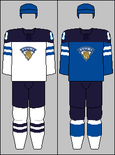
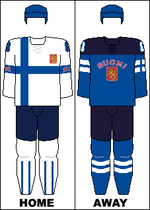
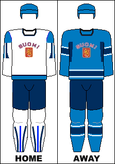
.png)
Retired jerseys
| No. | Player | Position | Career | Year of retirement |
|---|---|---|---|---|
| 5 | Timo Jutila | D | 1979–1999 | 2018 |
| 8 | Teemu Selänne | RW | 1987–2014 | 2015 |
| 11 | Saku Koivu | C | 1992–2014 | 2015 |
| 14 | Raimo Helminen | C | 1982–2008 | 2010 |
| 16 | Ville Peltonen | LW | 1991–2014 | 2015 |
| 17 | Jari Kurri | RW | 1977–1998 | 2007 |
| 26 | Jere Lehtinen | RW | 1992–2010 | 2015 |
| 44 | Kimmo Timonen | D | 1991–2015 | 2018 |
Notable players
- Keijo Kuusela 1948–1952
- Aarne Honkavaara 1948–1952
- Unto Wiitala 1949–1957
- Teppo Rastio 1954–1962
- Raimo Kilpiö 1957–1967
- Heino Pulli 1958–1965
- Lasse Oksanen 1964–1977
- Urpo Ylönen 1963–1978
- Esa Peltonen 1967–1980
- Heikki Riihiranta 1970–1976
- Juhani Tamminen 1970–1982
- Matti Hagman 1975–1987
- Reijo Ruotsalainen 1978–1989
- Jari Kurri 1979–1998
- Timo Jutila 1983–1997
- Raimo Helminen 1983–2008
- Jukka Tammi 1985–1998
- Esa Tikkanen 1985–2000
- Jarmo Myllys 1987–2001
- Janne Ojanen 1987–2002
- Teppo Numminen 1987–2006
- Mika Nieminen 1991–1998
- Teemu Selänne 1991–2014
- Jere Lehtinen 1992–2010
- Saku Koivu 1993–2010
- Sami Kapanen 1994–2010
- Ville Peltonen 1994–2012
- Ari Sulander 1995–2003
- Petteri Nummelin 1995–
- Kimmo Timonen 1996–2014
- Olli Jokinen 1997–2014
- Miikka Kiprusoff 1999–2010
- Sami Salo 2001–2014
- Mikko Koivu 2003–
- Jussi Jokinen 2003–
- Pekka Rinne 2004–
- Tuukka Rask 2005–
- Mikael Granlund 2010–
- Teuvo Teräväinen 2012–
- Marko Anttila 2013–
- Aleksander Barkov Jr. 2013–
- Sebastian Aho 2015–
- Mikko Rantanen 2015–
- Patrik Laine 2016–
- Kaapo Kakko 2019–
List of head coaches
- Erkki Saarinen 1939–1941
- Risto Lindroos 1945–1946
- Henry Kvist 1946–1949
- Risto Lindroos 1950–1954
- Aarne Honkavaara 1954–1959
- Joe Wirkkunen 1959–1960
- Derek Holmes 1960–1961
- Joe Wirkkunen 1961–1966
- Augustin "Gustav" Bubník 1966–1969
- Seppo Liitsola 1969–1972
- Len Lunde 1972–1973
- Kalevi Numminen 1973–1974
- Seppo Liitsola 1974–1976
- Lasse Heikkilä 1976–1977
- Kalevi Numminen 1977–1982
- Alpo Suhonen 1982–1986
- Rauno Korpi 1986–1987
- Pentti Matikainen 1987–1993
- Curt Lindström 1993–1997
- Hannu Aravirta 1997–2003
- Raimo Summanen 2003–2004
- Erkka Westerlund 2004–2007
- Doug Shedden 2007–2008
- Jukka Jalonen 2008–2013
- Erkka Westerlund 2013–2014
- Kari Jalonen 2014–2016[10]
- Lauri Marjamäki 2016–18[11]
- Jukka Jalonen 2018–[12]
References
- "IIHF Men's World Ranking". IIHF. 24 April 2020. Retrieved 24 April 2020.
- "Ice hockey: Selanne sets Olympic scoring record". Vancouver. 19 February 2010. Retrieved 10 March 2010.
- "Selanne's 37th point tops Games mark". ESPN. Associated Press. 20 February 2010. Retrieved 27 September 2010.
- Anrell, Lasse (14 May 2011). "Drömfinal". Aftonbladet (in Swedish). Retrieved 16 May 2011.
- "Jääkiekossa unelmafinaali Leijonat–Tre Kronor". Helsingin Sanomat (in Finnish). Sanoma. 13 May 2011. Retrieved 16 May 2011.
- Aykroyd, Lucas (15 May 2011). "It's gold for Finland!". IIHF. Archived from the original on 18 May 2011. Retrieved 16 May 2011.
- Steiss, Adam. "2020 IIHF Ice Hockey World Championship cancelled". iihf.com. IIHF. Retrieved 21 March 2020.
- "Miesten MM-kisat käyntiin perjantaina - Suomen MM-joukkue valittu". leijonat.fi. 5 May 2019.
- 2019 IIHF World Championship roster
- "Jalonen Leijonien seuraava päävalmentaja". mtv3.fi (in Finnish). 7 June 2013. Retrieved 7 June 2013.
- "IS: Marjamäki on Leijonien uusi päävalmentaja". mtv3.fi (in Finnish). 28 August 2015. Retrieved 28 August 2015.
- "Jukka Jalonen Palaa Leijonien päävalmentajaksi". iltalehti.fi (in Finnish). 4 October 2017. Retrieved 18 March 2018.